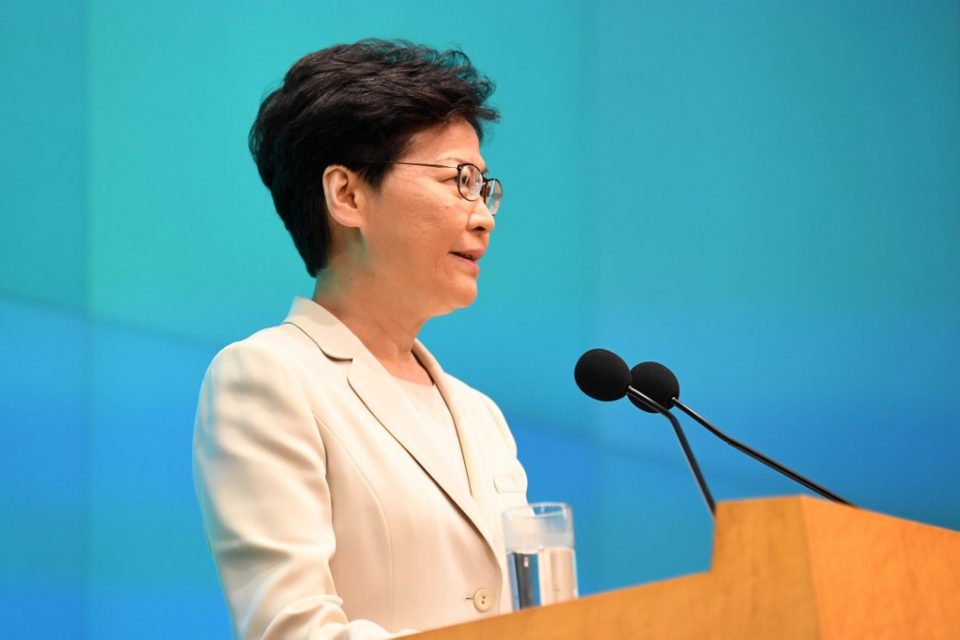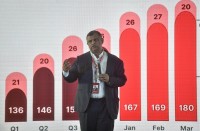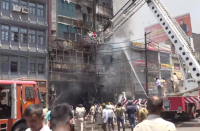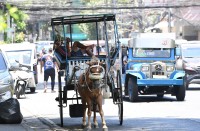
(Eagle News) — Embattled Hong Kong leader Carrie Lam offered her “most sincere apology” Tuesday for the political unrest that has shaken Hong Kong because of massive protests to the extradition bill, saying she “will not proceed with this legislative exercise” if it would continue to be unpopular with the people.
“In recognition of the anxiety and fears caused by the bill in the last few months, if we don’t have confidence from the people we will not proceed with the legislative exercise again,” Lam said.
“I will not proceed with this legislative exercise if these fears and anxieties could not be adequately addressed,” she said.
Lam told a room packed with journalists that she had “reflected deeply on all that has transpired.”
“I have heard you loud and clear,” she said, her voice at times shaking.
“I personally have to shoulder much of the responsibility. This has led to controversies, disputes and anxieties in society,” Lam told a press conference.
“For this I offer my most sincere apology to all people of Hong Kong.”
-No indication of stepping down-
But the Hong Kong chief executive, who has been accused of being pro-Beijing, gave no indication that she would be stepping down despite demands for her resignation.
She said that she wanted to “continue to work very hard… to meet the aspirations of the Hong Kong people”.
The extradition bill ignited several massive protests in the territory, including a march by nearly 2 million people on Sunday and by as many as 1 million people a week earlier. Police used tear gas, steel batons and rubber bullets to subdue protesters during scuffles outside the government headquarters last Wednesday.
The protests demanded the withdrawal of proposed legislation that would have allowed extraditions to mainland China.
Lam suspended the bill on Saturday after two massive rallies that saw isolated bouts of violence between the police and some protesters.
But that failed to quell public anger, and an even bigger rally Sunday drew over two million people, organizers said — more than a quarter of the population.
Protesters have demanded that the bill be fully withdrawn, and for Lam to step down and apologize for police using tear gas and rubber bullets to disperse protesters last week.
They have also asked for all charges to be dropped against anyone detained during the protests.
https://www.youtube.com/watch?v=oNo1F__N6Ns
Without explicitly stating so, Lam indicated, however, that the extradition bill was unlikely to be revived given the public sentiment.
“If the bill… (does) not make the legislative council by July next year, it will expire… and the government will accept that reality.”
– Public rage –
Critics of the legislation fear it will entangle the people of Hong Kong in China’s notoriously opaque and politicised justice system, and threaten Beijing’s critics.
The mass protests also drew support from the city’s formidable business community, amid fears the law would damage Hong Kong’s reputation as a safe business hub.
While the extradition issue had been the spark for the mass rallies, the protest movement has since morphed into the latest expression of public rage in Hong Kong against both the city’s leaders and Beijing.
Hong Kong enjoys freedoms unseen in mainland China under the terms of its 1997 handover from Britain to China.
But many residents fear that they are being slowly eroded by what they feel is Beijing’s tightening grip on the semi-autonomous city.
As recent evidence, they offer the failure of the huge pro-democracy “Umbrella Movement” in 2014, the imprisonment of protest leaders and disqualification of popular lawmakers, and the disappearance of booksellers critical of Beijing.
The Chinese government had supported the extradition proposal, and accused protest organisers of colluding with Western governments. It had denounced expressions of support for the Hong Kong protesters as interference in the city — and China’s — internal affairs.
But Beijing said after the bill’s suspension last week that it respected and understood the Hong Kong government’s decision.
with reports from Agence France-Presse and Associated Press







